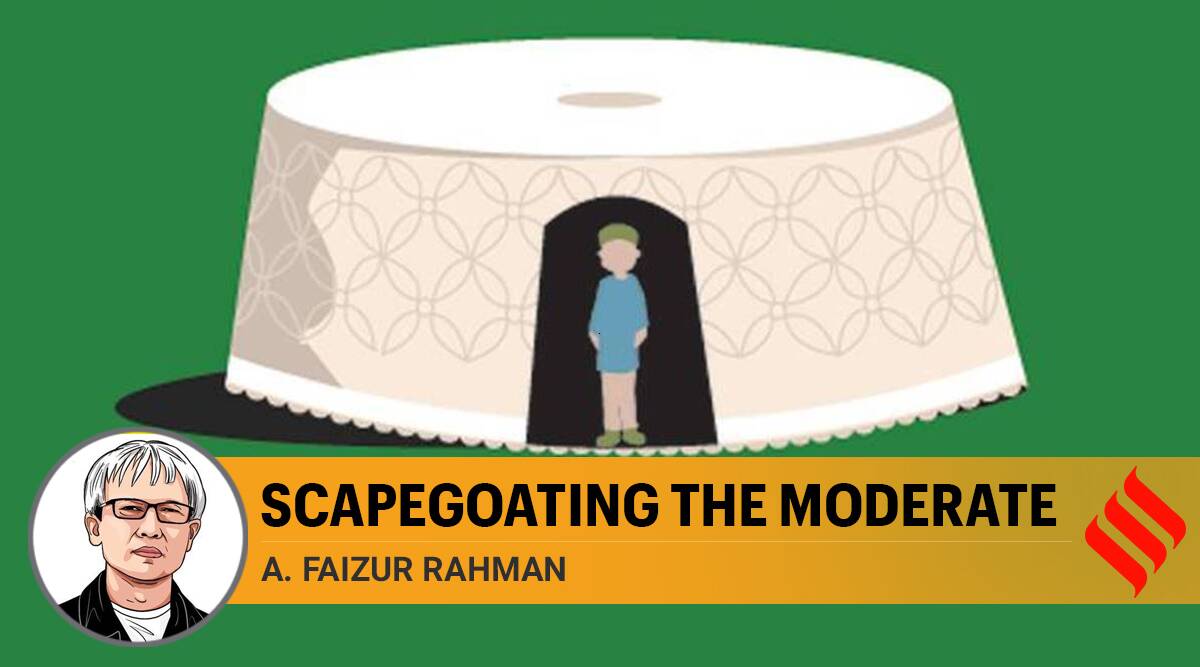If the “moderate Muslim” can be accused of being an apologist for Islam, the “agnostic Muslim” too sounds like an apologist for the Islamophobes.
Written by A. Faizur Rahman https://indianexpress.com/article/opinion/columns/paris-attack-muslims-islam-reform-secularism-human-rights-scapegoating-the-moderate-7048314/

Javed Anand is at it again — conflating Islam with the violent behaviour of some Muslims. His modus operandi appears to be to name any widely reported issue concerning Muslims and question, without any basis, the very idea of Islam.
In July 2017 in this newspaper (‘Islam’s reform: Way to go’), he used the triple talaq issue as a peg to suggest that the Quran had “bad” verses, an innuendo that was based not on any original research but rooted in the writings of Hassan Radwan, who founded the Agnostic Muslims & Friends group on Facebook. This author was forced to join issue with Anand to expose the speciousness of his arguments (‘The Word and its meanings’, August 22, 2017).
This time, too, in ‘The root cause fallacy’ (IE, November 6), Anand exploits the horrific cartoon-related murders in France to insinuate that Islam does not stand for peace. No evidence is produced to support this claim except the oft-repeated rhetorical question: “If Islam means peace, why is there so much violence across the globe in its name?”
To complete the violent imagery of Islam, he fabricates a phantasmic fall-guy called “moderate Muslim”, and defines him/her as one who cursorily condemns the aforementioned French murders “but quickly rushes to absolve Islam of any blame”.
However, the article’s main target is Islam, not the imaginary “moderate Muslim” who loves to quote from the Qur’an and Prophetic sayings to “emphatically affirm that Islam means peace”, as Anand mockingly puts it.
Anand’s hostility towards Islam seems to have blinded him to the contradictions in his own arguments. For instance, after accusing the “moderate Muslim” for absolving Islam of any blame, he cites scholar Reza Aslan to argue the opposite saying, “Islam, like every other religion, is what its followers make of it.”
He approvingly quotes another Muslim scholar, Farid Esack, as stating, “Whatever else Islam, as any other religion, may be, it is also that which is interpreted, lived out, aspired towards, ignored and debated among ordinary individuals and communities.”
But when Muslims try to argue that the violent acts of a miniscule minority cannot define Islam, “agnostic Muslims” such as Hassan Radwan and his admirers like Anand deride them as apologists for Islam who seek refuge in “whataboutery” and search for “root causes” everywhere except in their own religion. The fact, however, is that Anand could not find space in his long article to cite a single instance where any “moderate Muslim” can be held guilty of the aforementioned charges.
On the contrary, Muslim scholars and public intellectuals have always condemned violence committed in the name of Islam. A few days ago, this author organised a 90-minute international webinar to condemn the recent brutal killings in France and other places by Muslim fanatics. Nearly 90 intellectuals from across the world participated, including prominent Islamic scholars Ebrahim Moosa, Mustafa Akyol, and Ahmet T Kuru. Many such discussions have taken place all over the world in the last few days where Muslims have openly come out against violent responses to blasphemy.
These facts make Anand’s outburst against Islam totally unwarranted. His incoherent fustian has all the hallmarks of an argumentative device that seeks to camouflage his endeavour to not only project (without any basis) Islam as a violent religion but to also discredit (citing “whataboutery” and “root-cause fallacies”) sincere attempts from within the Muslim community to reclaim Islam from the extremists.
The Washington Post called out this mindset in a report published soon after the November 2015 terrorist attacks in Paris. Aptly titled ‘The next time someone blames Islam for ISIS, show them this’, it quotes Reza Aslan as saying, “We’re using two or three examples (of isolated cases of Islamist terrorism) to justify a generalisation. That’s actually the definition of bigotry”.
Anand’s favourite muse, Farid Esack, went further. Commenting on the 2015 Paris killings, he said, “I am not praying for Paris; I am not condemning anyone. Why the hell should I? I had nothing to do with it… I am sickened by the perpetual expectations to condemn. I walk away from your s****y racist and Islamophobic expectations that whenever your chickens come home to roost then I must feign horror.” Esack’s vexatious anger is not justifiable. But it gives us an idea of the complexities surrounding violent Muslim responses. The problem cannot be simplistically attributed to sectarian readings of Islam or to Islam itself, as Anand has done. Hidden beneath the surface are several unrecognised issues such as the discrimination of Muslims as minorities or migrants, restrictions on their religious freedom, economic deprivation and political disempowerment.
This is not true. Doctrinal differences between religions cannot be falsely equated with offence or blasphemy. Besides, the Quran in 6:108 warned Muslims against mocking other gods, and in chapter 109 categorically upheld religious freedom.
It is about time Anand realised that if the “moderate Muslim” can be accused of being an apologist for Islam, the “agnostic Muslim” too sounds like an apologist for the Islamophobes.
The writer is an independent researcher and secretary-general of the Islamic Forum for the Promotion of Moderate Thought